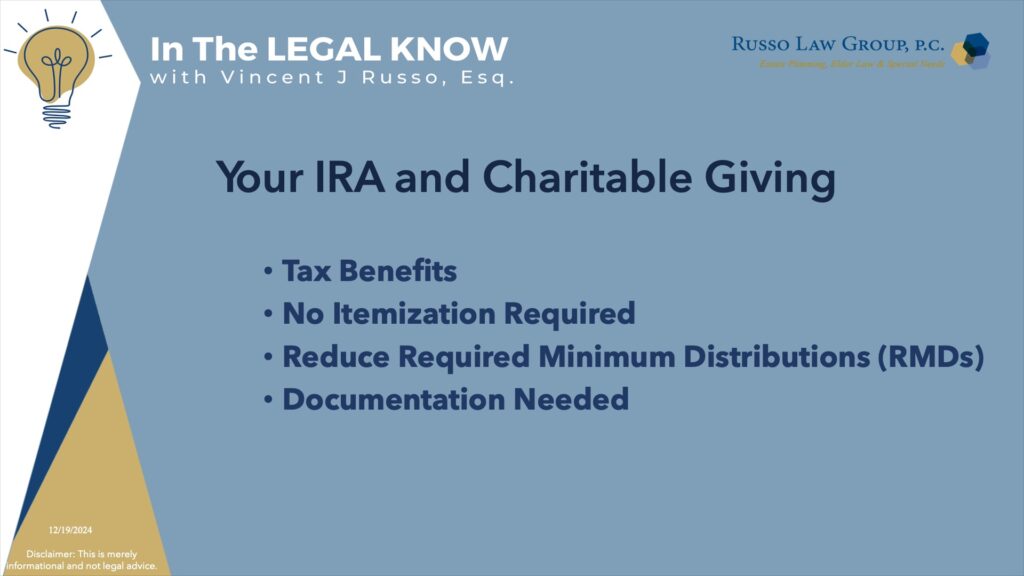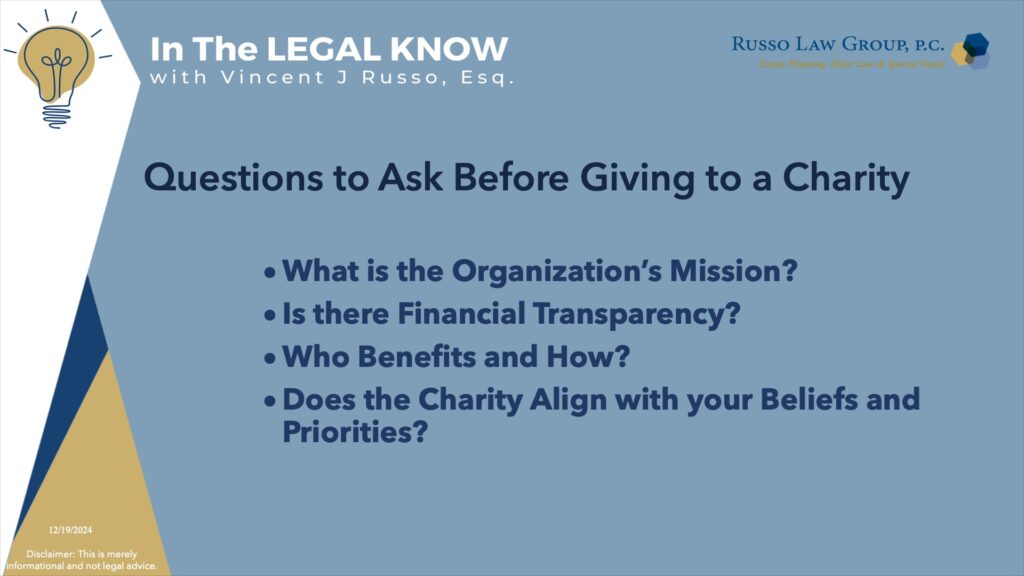Unlock success with effective Succession Planning for family businesses. Discover ways to facilitate smooth leadership changes.
What’s better than helping your favorite charity and reducing your tax bill? That’s exactly what charitable giving does—but only if you play by the rules and take advantage of the tax laws wisely.
Every year, the IRS provides incentives for you to help others, and 2024 is no different. But to maximize the benefits, you need to know the ins and outs of charitable donations.
This originally aired on the Catholic Faith Network’s show CFN Live: https://youtu.be/j6taJj39Oh4
What makes a donation tax-deductible?
Not all donations are created equal when it comes to taxes. To deduct your charitable contribution on your tax return, you must donate to a 501(c)(3) qualified organization. These are officially recognized nonprofits—think schools, religious organizations, or your local food bank. Giving money to a friend or cousin in need is generous, but Uncle Sam won’t reward you for that.
What types of donations qualify?
You can donate cash, which is straightforward, but don’t overlook other options.
Non-cash donations—like clothing, household items, even cars—can also be deducted, as long as they’re in good condition.
Plus, if you donate stocks or other securities, you could avoid capital gains tax while still claiming the full market value as a deduction. That’s a win-win!”
As to how much you can deduct? Typically, cash donations may be deducted up to 60% of your adjusted gross income (AGI). For non-cash donations, the rules can be stricter—usually around 30%. Be sure to check with your tax advisor to see what applies in your specific situation.”
Generally, you need to itemize your deductions in order to receive a tax benefit from your charitable giving. Itemizing deductions allow taxpayers to subtract certain expenses from their adjusted gross income, reducing their taxable income. Unlike the standard deduction (in 2024, $14,600 for a single taxpayer and $29,200 for a married couple), which is a flat amount based on filing status, itemizing lets you deduct specific expenses if they exceed the standard deduction amount.
How to Maximize your Giving Dollars
You can make your money work harder for good with smart and simple financial strategies. In fact, you may find that you can increase your giving by 20 percent or more—without feeling it in your bank account.
Try setting funds aside for giving so it’s a part of your budget, or make use of smart giving strategies such as:
- Donating Stock or other Appreciated Assets
- Giving appreciated assets can offer tax benefits and a greater total value for the charity.
- “Bunching” your charitable donations
- Using a charitable giving vehicle like a donor- advised fund or a charitable remainder trust
- Gifting from an IRA as a Qualified Charitable Distribution
Take some time to research the options and speak to your tax advisor to see if you can make your giving dollars stretch further.
Can you give to a charity from your IRA?
You can make a gift from an IRA as a Qualified Charitable Distribution if you meet certain requirements.
IRA owners who are at least 70.5 years old can give up to $105,000 tax-free to charity each year through qualified charitable distributions (QCDs). QCDs can count toward the owner’s required minimum distribution (RMD). A QCD is a direct transfer of money from an IRA to an eligible charity. The money never passes through the hands of the IRA holder.
A qualified charitable distribution (QCD) can be better than a charitable deduction for several reasons, including:
Tax benefits: QCDs can provide greater tax savings than charitable deductions. QCDs are not included in taxable income, and they can lower your adjusted gross income (AGI). This can help you stay below tax thresholds and save on Medicare premiums.
No itemization required: You can claim a QCD benefit without itemizing your taxes.
Reduce required minimum distributions (RMDs): QCDs can reduce the balance of your IRA, which may lower your RMDs in future years. For those age 73 or older, qualified charitable distributions (QCDs) also count toward the year’s required minimum distribution (RMD).
Documentation: Donors must obtain a written acknowledgement from the charity showing the contribution date, amount and confirmation that no goods or services were received.
What are some questions to ask before giving to a charity?
Before donating, ask yourself these key questions to ensure your contribution aligns with your values and makes a meaningful impact.
- Is the organization’s mission something I’m passionate about?
- How transparent are they about their finances and results?
- Who benefits from my donation, and how?
- Does this organization align with my beliefs and priorities?
Answering these questions will ensure your giving feels both intentional and connected to your values.
What else do we need to know when making charitable gifts?
Documentation is super important. The IRS is going to need proof, so always keep records. For cash donations under $250, you need a receipt, canceled check, or bank statement. Donations over $250? You’ll need a written acknowledgment from the charity that states the amount and confirms you didn’t receive any goods or services in return. Non-cash contributions may require an appraisal if the value is over $5,000. No paperwork, no deduction; simple as that.
There are also upcoming deadlines! “Time is ticking! To claim a deduction for 2024, you must make your donation by December 31st. Got stocks to donate? Coordinate with your broker now to ensure the transfer is complete before the year ends. Remember, even if you mail a check dated December 31st, it counts for this tax year—even if the charity doesn’t deposit it right way.
Be smart about where and how you give. Do your research, stay organized, and don’t wait until the last minute to plan your year-end contributions. And don’t forget—if you have any legal or financial questions, reach out to my law firm: the Russo Law Group. We’re here to help.
We hope you found this article helpful. Contact our office today at 1 (800) 680-1717 and schedule an appointment to discuss what makes sense for you and your loved ones.
Disclaimer: The information provided above is for general informational purposes only and is not legal advice.








Comments (0)